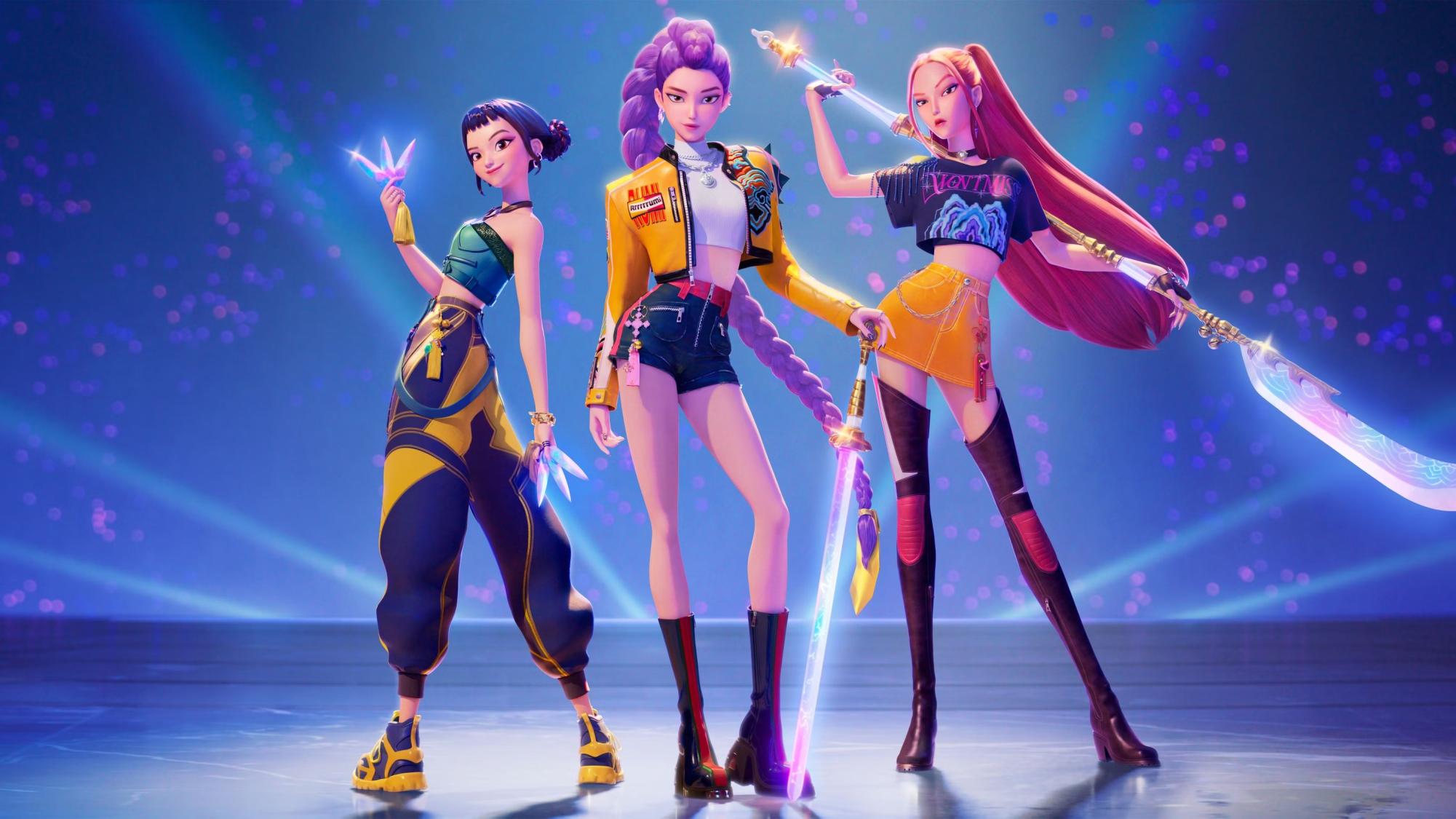Content warning: Major spoilers ahead.
On June 20, Netflix released their highly anticipated animated movie “KPop Demon Hunters.” In just over a month, the movie soon became Netflix’s highest viewed animated movie on the platform and many of its original songs topped multiple streaming charts around the world, a testament to its success and the popularity of K-pop.
The movie follows Rumi, Mira and Zoey—members of fictional K-pop girl group Huntr/x—as they moonlight as demon hunters hoping to seal the Demon Realm with the power of their fans. In an effort to prevent the sealing, the demon Jinu convinces Gwi-Ma to let him and four other demons make up a boy group to oppose the popular stars.
The movie’s artistry—from the animation to the voice acting to the singing and creation of songs—was all incredible. It’s clear that a lot of love and effort was put into the movie. However, despite its vibrant characters and captivating songs, the story itself felt underwhelming.
The movie’s biggest flaw lies within its pacing and plot. As a 100-minute movie, it was rather short. There was not enough time to explore the characters’ backgrounds and really connect with them. This was incredibly noticeable after a major character’s sudden death. His death didn’t pull any heartstrings, it was just shockingly hilarious due to its abrupt yet predictable nature. The redemption it was supposed to bring didn’t feel meaningful. As a jerk who didn’t own up to his past, honestly, the only thing that he had going for him was that he was hot and awkwardly goofy in a semi-endearing way. I think this issue stems from the movie trying to overextend itself to cater to a larger audience. Its advertised audience is clearly kids, which is seen through the simplistic dialogue, action-packed scenes and childish humor. Yet it clearly also wants to pander towards older K-pop fans with its message about idol culture, as well as the marketed enemies-to-lovers, romantic-comedy feel.
The movie could have had a much tighter storyline if it had only focused on one target audience rather than multiple. By trying to accommodate everyone, the audience is left with cringey conversations and forced romantic plotlines that are completely unnecessary to the overarching storyline of self-acceptance. It seemed that the male main character served only as a tool for Rumi’s journey of self-discovery, which was emphasized by her single tear after his sacrifice before she went back to singing.
Due to its rushed story, the movie also left many unanswered questions. Personally, my biggest one was how is it possible to have a half-demon when the demons in this movie are tied to shame and self-hate? If half-demons exist, then it undermines what it means to live as and become a demon when someone could simply be born a demon.
As someone who loosely follows the K-pop industry, it’s easy to see the influence and many overt messages regarding the K-pop industry. From fan wars to idol culture and idol personas, the overarching message of the movie reminds viewers how idols are “humans” too. Overall, the movie portrayed a much needed message about idolization and the K-pop industry, but the execution and subsequent reaction seemed to counter this very message.
The movie took a really interesting approach with the Saja Boys by making them caricatures of stereotypical idol personas. In the movie, they get practically no lines and what little personality they showed was tied to their persona. There was no background from where they came from or why they followed Jinu’s plans, reducing them to cannon fodder and comedic relief.
The commentary on idol personas is important to acknowledge in the K-Pop industry, but this message seemed to fall apart with the movie’s fixation on “Abby,” one of the Saja Boys known for his abs. Over the course of the movie, many different characters—including the members of Huntr/x—were seen gushing over his abs. While I wouldn’t call it sexualization, it is definitely along the lines of objectification, which is a real issue in the K-Pop industry today. By having the main characters also participate in it, it toned down the seriousness of the problem and made it seem like a quirky, fun thing to do.
Another interesting thing to point out is how the reaction from K-pop fans seem to counter the movie’s message. The movie’s entire commentary was on the idea that idols are still “human,” yet many viewers took to the internet to fawn over the rest of the Saja Boys besides Jinu. It was quite ironic seeing K-pop fans compare their favorite idols to those characters, not fully grasping the idea that they are just personas.
I want to be clear that I don’t hate the movie. I actually did enjoy watching it with friends. Its success is a very important message for the movie and animation industry about original stories and it is a fun watch, just as long as you don’t look too deeply into the characters and story.“KPop Demon Hunters” may prove itself to be unfocused in both theming and storyline, but at least it is enjoyable.



